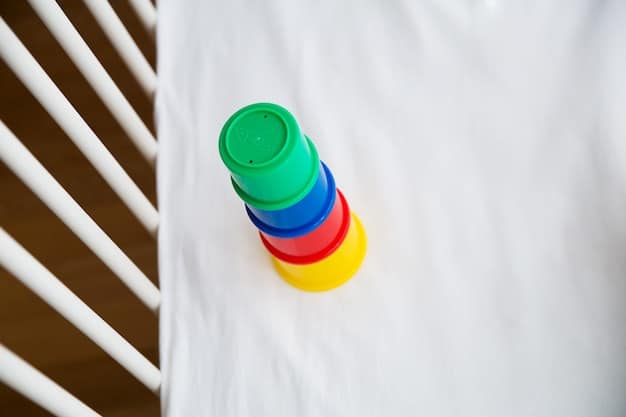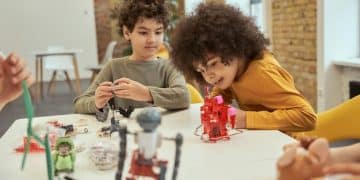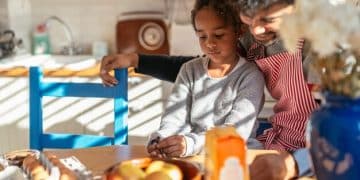The Impact of Toys on Child Development: Expert Insights

The impact of toys on child development is profound, shaping cognitive, social, and emotional skills; expert insights and carefully chosen toy recommendations can significantly enhance a child’s growth and learning experiences.
Toys are more than just playthings. Understanding the impact of toys on child development: expert insights and toy recommendations can guide parents and educators in making informed choices that nurture well-rounded growth.
Understanding the role of play in child development
Play is fundamental to child development. It’s through play that children learn to explore, experiment, and understand the world around them. Engaging with various types of toys facilitates this process, promoting cognitive, social, emotional, and physical growth.
Cognitive development through play
Toys play a vital role in cognitive development by stimulating problem-solving skills and creativity. This is especially true for toys that require children to think critically and use their imagination.
Social-emotional development through play
Play is crucial for children to develop social skills, emotional intelligence, and empathy. Through collaborative play, children learn how to share, communicate, and resolve conflicts.
- Enhances problem-solving skills.
- Encourages creativity and imagination.
- Develops social and emotional intelligence.
The role of play in child development is indispensable. Recognizing this importance allows parents and educators to intentionally incorporate play into a child’s daily routine, fostering holistic growth and development.
Selecting age-appropriate toys
Choosing the right toys for a child’s age and developmental stage is essential. Age-appropriate toys are designed to challenge and engage children without overwhelming them, maximizing their learning potential.

Toys for infants (0-12 months)
Infants benefit from toys that stimulate their senses. Toys with bright colors, different textures, and sounds are ideal for this age group. Safety is paramount, so toys should be free of small parts and made from non-toxic materials.
Toys for toddlers (1-3 years)
Toddlers need toys that encourage movement and creativity. Push-and-pull toys, simple puzzles, and art supplies are great choices. These toys help toddlers develop gross motor skills, fine motor skills, and self-expression.
- Infants: Rattles, soft toys, and mobiles to stimulate senses.
- Toddlers: Push-and-pull toys, simple puzzles, and art supplies for physical and creative development.
- Preschoolers: Building blocks, dress-up clothes, and board games to foster imagination and social skills.
Selecting age-appropriate toys ensures that children are challenged and engaged at their developmental stage. This mindful approach to toy selection promotes optimal growth and learning.
Types of toys that promote cognitive skills
Certain types of toys are particularly effective at promoting cognitive skills. These toys often require children to think critically, solve problems, and use their imagination, contributing to their overall intellectual development.
Building blocks and construction sets
Building blocks and construction sets are excellent for developing spatial reasoning, problem-solving skills, and fine motor coordination. Children learn about shapes, sizes, and structural stability as they build and create.
Puzzles and brain teasers
Puzzles and brain teasers challenge children to think logically and strategically. They improve problem-solving skills, spatial awareness, and concentration. Different types of puzzles cater to various age groups and skill levels.

- Building blocks foster spatial reasoning and problem-solving.
- Puzzles enhance logical thinking and concentration.
- Science kits encourage curiosity and experimentation.
Toys that promote cognitive skills are essential for intellectual development. By providing children with access to these types of toys, parents and educators can help them develop critical thinking abilities and a lifelong love of learning.
The impact of pretend play
Pretend play, also known as imaginative play, is a crucial aspect of child development. It allows children to explore different roles, express their emotions, and develop social skills. Toys that facilitate pretend play can significantly enhance these benefits.
Dress-up clothes and role-playing toys
Dress-up clothes and role-playing toys enable children to act out different scenarios and characters. This encourages creativity, empathy, and communication skills as they interact with others in imaginative ways.
Dolls and action figures
Dolls and action figures provide children with opportunities to nurture and care for others. Playing with these toys helps children develop empathy, responsibility, and social skills as they create stories and scenarios.
- Dress-up clothes foster creativity and empathy through role-playing.
- Dolls and action figures promote nurturing and social skills.
- Play kitchens and tool sets encourage imaginative problem-solving.
Pretend play is a powerful tool for child development. It fosters creativity, empathy, and social skills. Encouraging children to engage in pretend play with appropriate toys can lead to significant developmental benefits.
Toy safety considerations
Toy safety is a paramount concern for parents and caregivers. Choosing toys that meet safety standards and are appropriate for a child’s age is essential to prevent injuries and ensure a positive play experience.
Non-toxic materials
Ensure that toys are made from non-toxic materials and that the paints and coatings used are lead-free. This is particularly important for toys that young children are likely to put in their mouths.
Age-appropriate design
Select toys that are designed for the child’s age and developmental stage. Avoid toys with small parts that could be a choking hazard for young children. Check the toy’s packaging for age recommendations and safety warnings.
- Check for non-toxic materials to ensure safety.
- Avoid toys with small parts that pose a choking hazard.
- Regularly inspect toys for damage and wear.
Prioritizing toy safety is critical for protecting children from potential hazards. By choosing toys that meet safety standards and inspecting them regularly, parents and caregivers can create a safe and enjoyable play environment for children.
Expert toy recommendations
Experts in child development and education often recommend specific toys that align with developmental milestones and learning objectives. These recommendations can provide valuable guidance for parents and educators looking to enhance a child’s play experience.
Developmental milestones
Toys that support developmental milestones, such as fine motor skills, gross motor skills, and cognitive abilities, are often recommended by experts. These toys are designed to challenge children in age-appropriate ways, fostering growth and learning.
Educational value
Experts also emphasize the educational value of toys. Toys that teach specific skills, such as math, science, or language, are highly regarded. These toys can make learning fun and engaging, helping children develop a lifelong love of knowledge.
- Toys that support fine and gross motor skills are vital for physical development.
- Toys with educational value promote cognitive growth and learning.
- Toys that encourage social interaction enhance emotional and social development.
Expert toy recommendations offer valuable insights into selecting toys that support child development. By considering these recommendations, parents and educators can make informed choices that enhance a child’s play experience and promote holistic growth.
| Key Point | Brief Description |
|---|---|
| 🧠 Cognitive Skills | Toys improve problem-solving and creativity. |
| 🧸 Age-Appropriate Toys | Select toys based on the child’s developmental stage. |
| 🎭 Pretend Play | Fosters creativity, empathy, and social skills. |
| 🛡️ Toy Safety | Ensure toys are non-toxic and free of small parts. |
Frequently Asked Questions
▼
Toys are crucial tools for child development as they promote cognitive, social, emotional, and physical growth. They facilitate exploration and understanding of the world.
▼
Select toys that are designed for the child’s age and developmental stage. Check the toy’s packaging for age recommendations and safety warnings to ensure it is suitable.
▼
Pretend play fosters creativity, empathy, and social skills. It allows children to explore different roles, express their emotions, and develop communication skills through imaginative scenarios.
▼
Ensure that toys are made from non-toxic materials and do not have small parts that could be a choking hazard. Regularly inspect toys for damage and wear to maintain safety.
▼
Experts in child development and education often provide toy recommendations based on developmental milestones and learning objectives. Look for resources from trusted sources in the field.
Conclusion
Understanding the impact of toys on child development is crucial for parents and educators. By selecting age-appropriate, safe, and educational toys, we can foster holistic growth and create enriching play experiences that benefit children in countless ways.





